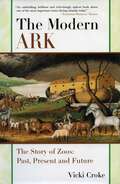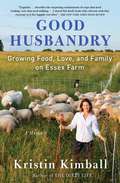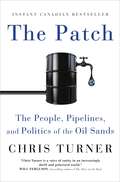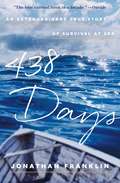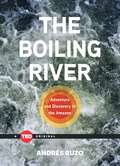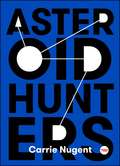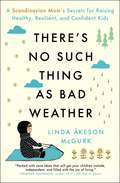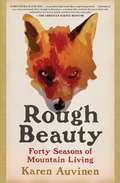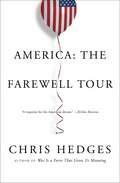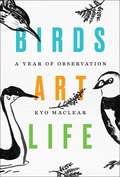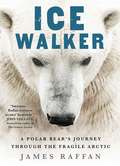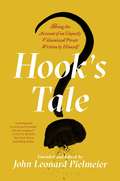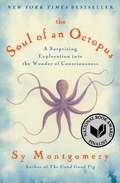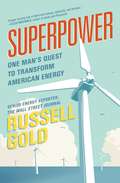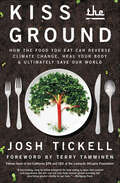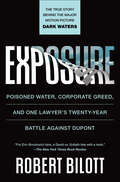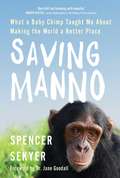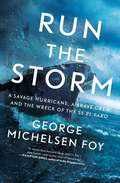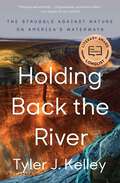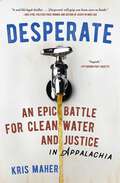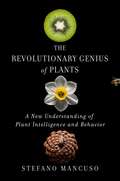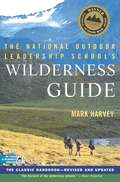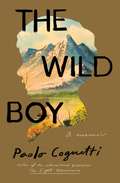- Table View
- List View
Grandad's Camper (Grandad's Camper)
by Harry WoodgateA Stonewall Honor BookBest Illustrated Book -- Waterstones Children's Book Prize 2022"As warm and friendly as a kind grandparent." Kirkus Reviews, STARRED REVIEW"For the hope for new adventures, and the glimpse of intergenerational kindness and understanding, this lovely book should be on every shelf." School Library Journal, STARRED REVIEW Best Picture Books of 2021--School Library JournalFuture Classic Picture Books of 2021--Bookstagang's Best of 2021"An effective tool for teaching empathy, and the intergenerational bond at the story's center is a heartstrings puller. This picture book, in which a girl helps her grandfather embrace life again following the death of Gramps, may well aid young readers in understanding others' grief." Shelf Awareness Discover a wonderful grandfather-granddaughter relationship, as a little girl hatches the perfect plan to get her Grandad adventuring again.Gramps and Grandad were adventurers. They would surf, climb mountains, and tour the country in their amazing camper. Gramps just made everything extra special. But after Gramps died, granddad hasn't felt like traveling anymore. So, their amazing granddaughter comes up with a clever plan to fix up the old camper and get Grandad excited to explore again.This beautiful picture book honors love and reminds us not only to remember those we have lost, but to celebrate them.
The Modern Ark: Past, Present, and Future
by Vicki CrokeAn in-depth look at the radical changes occurring in our nation's zoos -- from cement-paved mazes to simulated rain forests to completely natural landscapes -- as well as the history behind the actual idea of the zoo. Following the lead of private menageries in Europe, public zoos began to proliferate throughout America. What once started as symbols of prestige & power are now educational centers, developing advanced technologies in the race to conserve all that remains of the natural world. With DNA fingerprinting, artificial insemination, embryo transfers, & egg harvesting, zoos play a critical role in the fight to save endangered species.
Good Husbandry: Growing Food, Love, and Family on Essex Farm
by Kristin KimballFrom the author of the beloved bestseller The Dirty Life, this &“superb memoir chronicles the evolution of a farm, marriage, family, and her own personal identity with humor, insight, and candor&” (Publishers Weekly, starred review) detailing life on Essex Farm—a 500-acre farm that produces food for a community of 250 people.The Dirty Life chronicled Kimball&’s move from New York City to 500 acres near Lake Champlain where she started a new farm with her partner, Mark. In Good Husbandry, she reveals what happened over the next five years at Essex Farm.Farming has many ups and downs, and the middle years were hard for the Kimballs. Mark got injured, the weather turned against them, and the farm faced financial pressures. Meanwhile, they had two small children to care for. How does one traverse the terrain of a maturing marriage and the transition from being a couple to being a family? How will the farm survive? What does a family need in order to be happy?Kristin chose Mark and farm life after having a good look around the world, with a fair understanding of what her choices meant. She knew she had traded the possibility of a steady paycheck, of wide open weekends and spontaneous vacations, for a life and work that was challenging but beautiful and fulfilling. So with grit and grace and a good sense of humor, she chose to dig in deeper.Featuring some of the same local characters and cherished animals first introduced in The Dirty Life, (Jet the farm dog, Delia the dairy cow, and those hardworking draft horses), plus a colorful cast of aspiring first-generation farmers who work at Essex Farm to acquire the skills they need to start sustainable farms of their own, Good Husbandry &“considers what it means to build a good, happy life, and how we are tested in that endeavor&” (Mary Beth Keane, New York Times bestselling author of Ask Again, Yes).
The Patch: The People, Pipelines, and Politics of the Oil Sands
by Chris TurnerBestselling author Chris Turner brings readers onto the streets of Fort McMurray, showing the many ways the oilsands impact our lives and demanding that we ask the question: In order to both fuel the world and to save it, what do we do about the Patch?In its heyday, the oilsands represented an industrial triumph and the culmination of a century of innovation, experiment, engineering, policy, and finance. Fort McMurray was a boomtown, the centre of a new gold rush, and the oilsands were reshaping the global energy, political, and financial landscapes. The future seemed limitless for the city and those who drew their wealth from the bitumen-rich wilderness. But in 2008, a new narrative for the oilsands emerged. As financial markets collapsed and the scientific reality of the Patch’s effect on the environment became clear, the region turned into a boogeyman and a lightning rod for the global movement combatting climate change. Suddenly, the streets of Fort McMurray were the front line of a high-stakes collision between two conflicting worldviews—one of industrial triumph and another of environmental stewardship—each backed by major players on the world stage. The Patch is the seminal account of this ongoing conflict, showing just how far the oilsands reaches into all of our lives. From Fort Mac to the Bakken shale country of North Dakota, from Houston to London, from Saudi Arabia to the shores of Brazil, the whole world is connected in this enterprise. And it requires us to ask the question: In order to both fuel the world and to save it, what do we do about the Patch?
438 Days: An Extraordinary True Story of Survival at Sea
by Jonathan Franklin"The best survival book in a decade" (Outside magazine), 438 Days is the true story of the fisherman who survived fourteen months in a small boat drifting seven thousand miles across the Pacific Ocean.On November 17, 2012, a pair of fishermen left the coast of Mexico for a weekend fishing trip in the open Pacific. That night, a violent storm ambushed them as they were fishing eighty miles offshore. As gale force winds and ten-foot waves pummeled their small, open boat from all sides and nearly capsized them, captain Salvador Alvarenga and his crewmate cut away a two-mile-long fishing line and began a desperate dash through crashing waves as they sought the safety of port. Fourteen months later, on January 30, 2014, Alvarenga, now a hairy, wild-bearded and half-mad castaway, washed ashore on a nearly deserted island on the far side of the Pacific. He could barely speak and was unable to walk. He claimed to have drifted from Mexico, a journey of some seven thousand miles. 438 Days is the first-ever account of one of the most amazing survival stories in modern times. Based on dozens of hours of exclusive interviews with Alvarenga, his colleagues, search-and-rescue officials, the remote islanders who found him, and the medical team that saved his life, 438 Days is an unforgettable study of the resilience, will, ingenuity and determination required for one man to survive more than a year lost and adrift at sea.
The Boiling River: Adventure and Discovery in the Amazon (TED Books)
by Andrés RuzoIn this exciting adventure mixed with amazing scientific study, a young, exuberant explorer and geoscientist journeys deep into the Amazon--where rivers boil and legends come to life.<P><P> When Andrés Ruzo was just a small boy in Peru, his grandfather told him the story of a mysterious legend: There is a river, deep in the Amazon, which boils as if a fire burns below it. Twelve years later, Ruzo--now a geoscientist--hears his aunt mention that she herself had visited this strange river. <P> Determined to discover if the boiling river is real, Ruzo sets out on a journey deep into the Amazon. What he finds astounds him: In this long, wide, and winding river, the waters run so hot that locals brew tea in them; small animals that fall in are instantly cooked. As he studies the river, Ruzo faces challenges more complex than he had ever imaged. <P> The Boiling River follows this young explorer as he navigates a tangle of competing interests--local shamans, illegal cattle farmers and loggers, and oil companies. This true account reads like a modern-day adventure, complete with extraordinary characters, captivating plot twists, and jaw-dropping details--including stunning photographs and a never-before-published account about this incredible natural wonder. Ultimately, though, The Boiling River is about a man trying to understand the moral obligation that comes with scientific discovery --to protect a sacred site from misuse, neglect, and even from his own discovery.
Asteroid Hunters (TED Books)
by Carrie NugentFor the first time, scientists could have the knowledge to prevent a natural disaster epic in scale—an asteroid hitting the earth and in this exciting, adventuresome book, Carrie Nugent explains how.What are asteroids, and where do they come from? And, most urgently: Are they going to hit the Earth? What would happen if one was on its way? Carrie Nugent is an asteroid hunter—part of a group of scientists working to map our cosmic neighborhood. For the first time ever, we are reaching the point where we may be able to prevent the horrible natural disaster that would result from an asteroid collision. In Asteroid Hunters, Nugent reveals what known impact asteroids have had: the extinction of the dinosaurs, the earth-sized hole Shoemaker Levy 9 left in Jupiter just a few decades ago, how the meteorite that bursted over Chelyabinsk in Russia could have started a war, and unlucky Ms. Anne Hodges—the only person (that we know of) in US history to be the victim of a direct hit. Nugent also introduces the telescope she uses to detect near-Earth asteroids. Ultimately, detection is the key to preventing asteroid impact, and these specialized scientists are working to prevent the unthinkable from happening. If successful, asteroid hunting will lead to the first natural disaster humans have the know-how and the technology to prevent. The successful hunt and mapping of asteroids could mean nothing less than saving life on earth.
There's No Such Thing as Bad Weather: A Scandinavian Mom's Secrets for Raising Healthy, Resilient, and Confident Kids (from Friluftsliv to Hygge)
by Linda Åkeson Mcgurk“A perfect antidote to the hyper-vigilant, extra-electrified, standardized-tested, house-arrested, 21st-century childhood.” —Richard Louv, bestselling author of Last Child in the Woods and Vitamin N Bringing Up Bébé meets Last Child in the Woods in this lively, insightful memoir about a mother who sets out to discover if the nature-centric parenting philosophy of her native Scandinavia holds the key to healthier, happier lives for her American children.When Swedish-born Linda McGurk moved to small-town Indiana with her American husband to start a family, she quickly realized that her outdoorsy ways were not the norm. In Sweden children play outside all year round, regardless of the weather, and letting young babies nap outside in freezing temperatures is not only common—it is a practice recommended by physicians. In the US, on the other hand, she found that the playgrounds, which she had expected to find teeming with children, were mostly deserted. In preschool, children were getting drilled to learn academic skills, while their Scandinavian counterparts were climbing trees, catching frogs, and learning how to compost. Worse, she realized that giving her daughters the same freedom to play outside that she had enjoyed as a child in Sweden could quickly lead to a visit by Child Protective Services. The brewing culture clash finally came to a head when McGurk was fined for letting her children play in a local creek, setting off an online firestorm when she expressed her anger and confusion on her blog. The rules and parenting philosophies of her native country and her adopted homeland were worlds apart. Struggling to fit in and to decide what was best for her children, McGurk turned to her own childhood for answers. Could the Scandinavian philosophy of “there is no such thing as bad weather, only bad clothes” be the key to better lives for her American children? And how would her children’s relationships with nature change by introducing them to Scandinavian concepts like friluftsliv (“open-air living”) and hygge (the coziness and the simple pleasures of home)? McGurk embarked on a six-month-long journey to Sweden to find out. There’s No Such Thing as Bad Weather is a fascinating personal narrative that highlights the importance of spending time outdoors, and illustrates how the Scandinavian culture could hold the key to raising healthier, resilient, and confident children in America.
Rough Beauty: Forty Seasons of Mountain Living
by Karen AuvinenIn the bestselling tradition of Cheryl Strayed&’s Wild and Helen MacDonald&’s H Is for Hawk, Karen Auvinen, an award-winning poet, ventures into the wilderness to seek answers to life&’s big questions with &“candor [and] admirable courage&” (Christian Science Monitor).Determined to live an independent life on her own terms, Karen Auvinen flees to a primitive cabin in the Rockies to live in solitude as a writer and to embrace all the beauty and brutality nature has to offer. When a fire incinerates every word she has ever written and all of her possessions—except for her beloved dog Elvis, her truck, and a few singed artifacts—Karen embarks on a heroic journey to reconcile her desire to be alone with her need for community. In the evocative spirit of works by Annie Dillard, Gretel Ehrlich, and Terry Tempest Williams, Karen&’s &“beautiful, contemplative…breathtaking [debut] memoir honors the wildness of the Rockies&” (Publishers Weekly, starred review). &“Rough Beauty offers a glimpse into a life that&’s pared down to its essentials, open to unexpected, even profound, change&” (Brevity Magazine), and Karen&’s pursuit of solace and salvation through shedding trivial ties and living in close harmony with nature, along with her account of finding community and even love, is sure to resonate with all of us who long for meaning and deeper connection. An &“outstanding…beautiful story of resilience&” (Kirkus Reviews, starred review), Rough Beauty is a luminous, lyric exploration, &“a narrative that reads like a captivating novel...a voice not found often enough in literature—a woman who eschews the prescribed role outlined for her by her family and discovers her own path&” (Christian Science Monitor) to embrace the unpredictability and grace of living intimately with the forces of nature.
America: The Farewell Tour
by Chris HedgesA profound and provocative examination of America in crisis, where unemployment, deindustrialization, and a bitter hopelessness and malaise have resulted in an epidemic of diseases of despair—drug abuse, gambling, suicide, magical thinking, xenophobia, and a culture of sadism and hate.America, says Pulitzer Prize–winning reporter Chris Hedges, is convulsed by an array of pathologies that have arisen out of profound hopelessness, a bitter despair and a civil society that has ceased to function. The opioid crisis, the retreat into gambling to cope with economic distress, the pornification of culture, the rise of magical thinking, the celebration of sadism, hate, and plagues of suicides are the physical manifestations of a society that is being ravaged by corporate pillage and a failed democracy. As our society unravels, we also face global upheaval caused by catastrophic climate change. All these ills presage a frightening reconfiguration of the nation and the planet. Donald Trump rode this disenchantment to power. In America: The Farewell Tour, Hedges argues that neither political party, now captured by corporate power, addresses the systemic problem. Until our corporate coup d’état is reversed these diseases will grow and ravage the country. A poignant cry reported from communities across the country, America: The Farewell Tour seeks to jolt us out of our complacency while there is still time.
Birds Art Life: A Year of Observation
by Kyo MaclearA writer’s search for inspiration, beauty, and solace leads her to birds in this intimate and exuberant meditation on creativity and life—a field guide to things small and significant.When it comes to birds, Kyo Maclear isn’t seeking the exotic. Rather she discovers joy in the seasonal birds that find their way into view in city parks and harbors, along eaves and on wires. In a world that values big and fast, Maclear looks to the small, the steady, the slow accumulations of knowledge, and the lulls that leave room for contemplation. A distilled, crystal-like companion to H is for Hawk, Birds Art Life celebrates the particular madness of chasing after birds in the urban environment and explores what happens when the core lessons of birding are applied to other aspects of art and life. Moving with ease between the granular and the grand, peering into the inner landscape as much as the outer one, this is a deeply personal year-long inquiry into big themes: love, waiting, regrets, endings. If Birds Art Life was sprung from Maclear’s sense of disconnection, her passions faltering under the strain of daily existence, this book is ultimately about the value of reconnection—and how the act of seeking engagement and beauty in small ways can lead us to discover our most satisfying and meaningful lives.
Ice Walker: A Polar Bear's Journey through the Fragile Arctic
by James RaffanFrom bestselling author James Raffan comes an enlightening and original story about a polar bear&’s precarious existence in the changing Arctic, reminiscent of John Vaillant&’s The Golden Spruce.Nanurjuk, &“the bear-spirited one,&” is hunting for seals on Hudson Bay, where ice never lasts more than one season. For her and her young, everything is in flux. From the top of the world, Hudson Bay looks like an enormous paw print on the torso of the continent, and through a vast network of lakes and rivers, this bay connects to oceans across the globe. Here, at the heart of everything, walks Nanurjuk, or Nanu, one polar bear among the six thousand that traverse the 1.23 million square kilometers of ice and snow covering the bay. For millennia, Nanu&’s ancestors have roamed this great expanse, living, evolving, and surviving alongside human beings in one of the most challenging and unforgiving habitats on earth. But that world is changing. In the Arctic&’s lands and waters, oil has been extracted—and spilled. As global temperatures have risen, the sea ice that Nanu and her young need to hunt seal and fish has melted, forcing them to wait on land where the delicate balance between them and their two-legged neighbors has now shifted. This is the icescape that author and geographer James Raffan invites us to inhabit in Ice Walker. In precise and provocative prose, he brings readers inside Nanu&’s world as she treks uncertainly around the heart of Hudson Bay, searching for nourishment for the children that grow inside her. She stops at nothing to protect her cubs from the dangers she can see—other bears, wolves, whales, human beings—and those she cannot. By focusing his lens on this bear family, Raffan closes the gap between humans and bears, showing us how, like the water of the Hudson Bay, our existence—and our future—is tied to Nanu&’s. He asks us to consider what might be done about this fragile world before it is gone for good. Masterful, vivid, and haunting, Ice Walker is an utterly unique piece of creative nonfiction and a deeply affecting call to action.
Hook's Tale: Being the Account of an Unjustly Villainized Pirate Written by Himself
by John Leonard PielmeierA rollicking debut novel from award-winning playwright and screenwriter John Pielmeier reimagines the childhood of the much maligned Captain Hook: his quest for buried treasure, his friendship with Peter Pan, and the story behind the swashbuckling world of Neverland.Long defamed as a vicious pirate, Captain James Cook (a.k.a Hook) was in fact a dazzling wordsmith who left behind a vibrant, wildly entertaining, and entirely truthful memoir. His chronicle offers a counter narrative to the works of J.M. Barrie, a “dour Scotsman” whose spurious accounts got it all wrong. Now, award-winning playwright John Pielmeier is proud to present this crucial historic artifact in its entirety for the first time. Cook’s story begins in London, where he lives with his widowed mother. At thirteen, he runs away from home, but is kidnapped and pressed into naval service as an unlikely cabin boy. Soon he discovers a treasure map that leads to a mysterious archipelago called the “Never-Isles” from which there appears to be no escape. In the course of his adventures he meets the pirates Smee and Starkey, falls in love with the enchanting Tiger Lily, adopts an oddly affectionate crocodile, and befriends a charming boy named Peter—who teaches him to fly. He battles monsters, fights in mutinies, swims with mermaids, and eventually learns both the sad and terrible tale of his mother’s life and the true story of his father’s disappearance. Like Gregory Maguire’s Wicked, Hook’s Tale offers a radical new version of a classic story, bringing readers into a much richer, darker, and enchanting version of Neverland than ever before. The characters that our hero meets—including the terrible Doctor Uriah Slinque and a little girl named Wendy—lead him to the most difficult decision of his life: whether to submit to the temptation of eternal youth, or to embrace the responsibilities of maturity and the inevitability of his own mortality. His choice, like his story, is not what you might expect.
The Soul of an Octopus: A Surprising Exploration into the Wonder of Consciousness
by Sy MontgomeryFinalist for the National Book Award for Nonfiction * New York Times Bestseller * A Huffington Post Notable Nonfiction Book of the Year * One of the Best Books of the Month on Goodreads * Library Journal Best Sci-Tech Book of the Year * An American Library Association Notable Book of the Year &“Sy Montgomery&’s The Soul of an Octopus does for the creature what Helen Macdonald&’s H Is for Hawk did for raptors.&” —New Statesman, UK &“One of the best science books of the year.&” —Science Friday, NPR Another New York Times bestseller from the author of The Good Good Pig, this &“fascinating…touching…informative…entertaining&” (The Daily Beast) book explores the emotional and physical world of the octopus—a surprisingly complex, intelligent, and spirited creature—and the remarkable connections it makes with humans.In pursuit of the wild, solitary, predatory octopus, popular naturalist Sy Montgomery has practiced true immersion journalism. From New England aquarium tanks to the reefs of French Polynesia and the Gulf of Mexico, she has befriended octopuses with strikingly different personalities—gentle Athena, assertive Octavia, curious Kali, and joyful Karma. Each creature shows her cleverness in myriad ways: escaping enclosures like an orangutan; jetting water to bounce balls; and endlessly tricking companions with multiple “sleights of hand” to get food. Scientists have only recently accepted the intelligence of dogs, birds, and chimpanzees but now are watching octopuses solve problems and are trying to decipher the meaning of the animal’s color-changing techniques. With her “joyful passion for these intelligent and fascinating creatures” (Library Journal Editors’ Spring Pick), Montgomery chronicles the growing appreciation of this mollusk as she tells a unique love story. By turns funny, entertaining, touching, and profound, The Soul of an Octopus reveals what octopuses can teach us about the meeting of two very different minds.
Superpower: One Man's Quest to Transform American Energy
by Russell GoldIn the ever more urgent quest for sources of renewable energy, meet the man boldly harnessing the natural forces that could power America’s future.The United States is in the midst of an energy transition. We want to embrace renewable energy sources like wind and solar, and rely less on dirty fossil fuels. We don’t want to keep pumping so many heat-trapping gases into the atmosphere. Any transition from a North American power grid that uses mostly fossil fuels to one that is predominantly clean requires a massive building spree—billions of dollars’ worth. Enter Michael Skelly, an infrastructure builder who began working on wind energy in 2000, when many considered the industry a joke. Eight years later, Skelly helped create the second largest wind power company in the United States—which was sold for $2 billion. Wind energy was no longer funny; it was well on its way to generating a substantial percentage of the electricity in the United States. Acclaimed journalist and author of The Boom, “the best all-around book yet on fracking” (San Francisco Chronicle), Russell Gold tells the story of this pioneer whose innovations, struggles, and persistence represent the groundbreaking changes underway in American energy. InSuperpower, we meet Skelly’s financial backers, a family that pivoted from oil exploration to renewable energy; the farmers ready to embrace the new “cash crop”; the landowners prepared to go to court to avoid looking at overhead wires; and utility executives who concoct fiendish ways to block renewable energy. Gold also shows how Skelly’s innovative company, Clean Line Energy, conceived the idea for a new power grid that would allow sunlight where abundant to light up homes thousands of miles away in cloudy states, and take wind from the Great Plains to keep air conditioners running in Atlanta. Thrilling, provocative, and important, Superpower is a fascinating look at America’s future.
Kiss the Ground: How the Food You Eat Can Reverse Climate Change, Heal Your Body & Ultimately Save Our World
by Josh TickellFrom Josh Tickell, one of America&’s most celebrated documentary filmmakers, comes a &“fascinating, easy-to-follow blueprint for how eating in ways that nourish and regenerate the soil can not only help reverse global warming, but also bring greater vitality to our lives&” (Wolfgang Puck). &“A must read for anyone committed to healing our bodies and our Earth&” (Deepak Chopra), Kiss the Ground explains an incredible truth: by changing our diets to a soil-nourishing, regenerative agriculture diet, we can reverse global warming, harvest healthy, abundant food, and eliminate the poisonous substances that are harming our children, pets, bodies, and ultimately our planet. This &“richly visual&” (KirkusReviews) look at the impact of an underappreciated but essential resource—the very ground that feeds us—features fascinating and accessible interviews with celebrity chefs, ranchers, farmers, and top scientists. Kiss the Ground teaches you how to become an agent in humanity&’s single most important and time-sensitive mission: reverse climate change and effectively save the world—all through the choices you make in how and what to eat. Also a full-length documentary executive produced by Leonardo DiCaprio and narrated by Woody Harrelson, &“Kiss the Ground both informs and inspires&” (Marianne Williamson, #1 New York Times bestselling author).
Exposure: Poisoned Water, Corporate Greed, and One Lawyer's Twenty-Year Battle against DuPont
by Robert BilottThe true story of a lawyer’s fight to expose DuPont’s deadly chemical contamination—“For Erin Brockovich fans, a David vs. Goliath tale with a twist” (The New York Times Book Review)1998: Attorney Rob Bilott specializes in helping big corporations follow environmental regulations. Then he gets a phone call from a West Virginia farmer who is convinced the creek on his property is being poisoned by the neighboring DuPont landfill, causing his cattle to die in hideous ways. No local lawyer or regulatory agency will take the case. As soon as they hear the name DuPont—the area’s largest employer—they shut him down.Once Rob sees the foamy water that bubbles into the creek, the gruesome effects it seems to have on livestock, and the disturbing frequency of cancer and other health problems in the area, he’s persuaded to fight against the type of corporation he routinely represents. Rob’s dogged legal wrangling reveals how DuPont had hidden decades of studies proving the harmful effects of PFOA, a chemical used in making Teflon. The case of one farmer spawns a class action suit on behalf of seventy thousand residents—and the shocking realization that virtually every person on the planet carries the “forever chemical” PFOA in his or her blood. Exposed is a legal drama “in the grand tradition of Jonathan Harr’s A Civil Action” about malice, manipulation, and one lawyer’s twenty-year struggle to expose the truth (Booklist, starred review).
A Walk in the Park: The True Story of a Spectacular Misadventure in the Grand Canyon
by Kevin FedarkoTwo friends, zero preparation, one dream. From the author of the beloved bestseller The Emerald Mile, a rollicking and poignant account of an epic 750-mile odyssey, on foot, through the heart of America&’s most magnificent national park and the grandest wilderness on earth.A few years after quitting his job to follow an ill-advised dream of becoming a guide on the Colorado River, Kevin Fedarko was approached by his best friend, the National Geographic photographer Pete McBride, with a vision as bold as it was harebrained. Together, they would embark on an end-to-end traverse of the Grand Canyon, a journey that, McBride promised, would be &“a walk in the park.&” Against his better judgment, Fedarko agreed to the scheme, unaware that the small cluster of experts who had completed the crossing billed it as &“the toughest hike in the world.&” The ensuing ordeal, which lasted more than a year, revealed a place that was deeper, richer, and far more complex than anything the two men had imagined—and came within a hair&’s breadth of killing them both. They struggled to make their way through the all but impenetrable reaches of its truest wilderness, a vertical labyrinth of thousand-foot cliffs and crumbling ledges where water is measured out by the teaspoon and every step is fraught with peril—and where, even today, there is still no trail along the length of the country&’s best-known and most iconic park. Along the way, veteran long-distance hikers ushered them into secret pockets, invisible to the millions of tourists gathered on the rim, where only a handful of humans have ever laid eyes. Members of the canyon&’s eleven Native American tribes brought them face-to-face with layers of history that forced them to reconsider myths at the center of our national parks—and exposed them to the impinging threats of commercial tourism. Even Fedarko&’s dying father, who had first pointed him toward the canyon more than forty years earlier but had never set foot there himself, opened him to a new way of seeing the landscape. And always, there was the great gorge itself: austere and unforgiving but suffused with magic, drenched in wonder, and redeemed by its own transcendent beauty. A Walk in the Park is a singular portrait of a sublime place, and a deeply moving plea for the preservation of America&’s greatest natural treasure.
Saving Manno: What a Baby Chimp Taught Me About Making the World a Better Place
by Spencer SekyerAn inspiring and uplifting memoir about one small-town teacher’s eye-opening travels around the world and his relentless efforts to rescue a chimp in danger.As a child, Spencer Sekyer’s world was a simple one. He grew up in a small town, where many of his days were spent hunting in the woods and pursuing his dream of becoming a professional athlete. But when his athletic career ended, he found himself seeking new goals. Spencer returned to school and became a teacher. Realizing he still had much to learn about the world, Spencer set out to explore its most dangerous areas. He traveled to Sierra Leone to volunteer in a local school, followed by trips to the West Bank, Afghanistan, and Haiti. Each time, Spencer returned home a little wiser, a little more emotionally mature, and a little more ready to give back to a world that had given him so much. In Duhok, Kurdistan, Spencer’s journey took a new turn. After stumbling into a local zoo, Spencer formed an unlikely bond with Manno, a young chimpanzee who had been kidnapped from his family in central Africa and sold into captivity. Determined to get Manno back to his home, Spencer began to investigate the shadowy, dangerous world of global animal trafficking. Facing resistance at every turn, and with ISIS closing in on Duhok, Spencer finally set in motion an international effort to get his friend to safety, before it was too late. Bursting with compassion, inspiration, and courage, Saving Manno is a testament to the fact that every one of us has the power to change lives and make the world a better place.
Run the Storm: A Savage Hurricane, a Brave Crew, and the Wreck of the SS El Faro
by George Michelsen Foy“Here is the pitch-perfect pairing of subject and author, a gripping deconstruction of one of recent history’s most terrible and vexing sea tragedies…A meticulous forensic study that, in Foy’s able hands, rises to the level of literature.” —Hampton Sides “Fans of The Perfect Storm and Into Thin Air will love this exquisitely written and dramatic book. George Foy has an action story that doesn’t quit.” —Doug Stanton “Foy is an experienced mariner who clearly knows his stuff, which gives the reader confidence in his account, and allows us to get lost in an amazing story that builds to a wild finish.” —John U. Bacon In the bestselling tradition of The Perfect Storm and The Finest Hours, a harrowing true account of the mysterious disappearance of the SS El Faro, a gigantic American cargo ship that sank in the Bermuda Triangle, taking with it thirty-three lives.On October 1, 2015, the SS El Faro, a massive American cargo ship that made regular runs between Jacksonville, Florida and Puerto Rico, delivering everything from deodorant to new Chevrolets, disappeared in Hurricane Joaquin, a category 4 storm. The ship, its hundreds of shipping containers, and its entire crew plummeted to the bottom of the ocean, three miles down. The sinking was the greatest seagoing US merchant marine shipping disaster since World War II. The massive ship had a seasoned crew, state-of-the-art navigation equipment, and advance warning of the storm. It seemed incomprehensible that such a ship could sink so suddenly. How, in this day and age, could something like this happen? The answer is that a ship as large as the El Faro doesn’t vanish for just one reason; it vanishes because many factors intersect—everything from hurricane-tracking algorithms to the decay of rubber gaskets on hatches to the arcane science of loading cargo containers to the psychology of a powerful ship’s captain. All of these factors and more came into play in the sinking of the El Faro. Relying on Coast Guard inquest hearings as well as on numerous interviews, George Michelsen Foy has crafted a brilliant account that brings to life the final voyage of El Faro, a story that lasts only a few days but which grows almost intolerably suspenseful as deep-rooted flaws leading to the disaster inexorably link together and worsen. We see captain, engineers, and crew fight for their lives, and hear their actual words (as recorded on the ship’s black box) while the hurricane relentlessly tightens its noose around the ship. We watch, minute by minute, all that is happening on board—the ship’s mysterious tilt to one side, worried calls to the engine room, ship-to-shore reports, the courage of the men and women as they fight to survive, and the berserk ocean’s savage consumption of the massive hull. And through it all, the pain and ultimate resilience of the families of El Faro’s crew. Meticulous and absolutely thrilling, Run the Storm is a masterwork of stunning power.
Holding Back the River: The Struggle Against Nature on America's Waterways
by Tyler J. KelleyA revelatory work of reporting on the men and women wrestling to harness and preserve America&’s most vital natural resource: our rivers.The Mississippi. The Missouri. The Ohio. America&’s great rivers are the very lifeblood of our country. We need them for nourishing crops, for cheap bulk transportation, for hydroelectric power, for fresh drinking water. Rivers are also part of our mythology, our collective soul; they are Mark Twain, Led Zeppelin, and the Delta Blues. But as infrastructure across the nation fails and climate change pushes rivers and seas to new heights, we&’ve arrived at a critical moment in our battle to tame these often-destructive forces of nature. Tyler J. Kelley spent two years traveling the heartland, getting to know the men and women whose lives and livelihoods rely on these tenuously tamed streams. The result, Holding Back the River, is a deeply human exploration of how our centuries-long dream of conquering and shaping this vast network of waterways squares with the reality of an indomitable natural world. On the Illinois-Kentucky border, we encounter Luther Helland, master of the most important—and most decrepit—lock and dam in American. This old dam, at the tail end of the Ohio River, was scheduled to be replaced in 1998, but twenty years and $3 billion later, its replacement still isn&’t finished. As the old dam crumbles and commerce grinds to a halt, Helland and his team must risk their lives, using steam-powered equipment and sheer brawn, to raise and lower the dam as often as ten times a year. In Southeast Missouri, we meet Twan Robinson, who lives in the historically Black village of Pinhook. As a super-flood rises on the Mississippi, she learns from her sister that the US Army Corps of Engineers is going to blow up the levee that stands between her home and the river. With barely enough notice to evacuate her elderly mother and pack up a few of her own belongings, Robinson escapes to safety only to begin a nightmarish years-long battle to rebuild her lost community. Atop a floodgate in central Louisiana, we&’re beside Major General Richard Kaiser, the man responsible for keeping North America&’s greatest river under control. Kaiser stands above the spot where the Mississippi River wants to change course, abandoning Baton Rouge and New Orleans, and following the Atchafalaya River to the sea. The daily flow of water from one river to the other is carefully regulated, but something else is happening that may be out of Kaiser and the Corps&’ control. America&’s infrastructure is old and underfunded. While our economy, society, and climate have changed, our levees, locks, and dams have not. Yet to fix what&’s wrong will require more than money. It will require an act of imagination. Meticulously researched and as lively as it is informative, Holding Back the River brings us into the lives of the Americans who grapple with our mighty rivers and, through their stories, suggests solutions to some of the century&’s greatest challenges.
Desperate: An Epic Battle for Clean Water and Justice in Appalachia
by Kris MaherSet in Appalachian coal country, this &“superb&” (Pittsburgh Post-Gazette) legal drama follows one determined lawyer as he faces a coal industry giant in a seven-year battle over clean drinking water for a West Virginia community.For two decades, the water in the taps and wells of Mingo County didn&’t look, smell, or taste right. Could the water be the root of the health problems—from kidney stones to cancer—in this Appalachian community? Environmental lawyer Kevin Thompson certainly thought so.For seven years, Thompson waged an epic legal battle against Massey Energy, West Virginia&’s most powerful coal company, helmed by CEO Don Blankenship. While Massey&’s lawyers worked out of a gray glass office tower in Charleston known as &“the Death Star,&” Thompson set up shop in a ramshackle hotel in the fading coal town of Williamson. Working with fellow lawyers and a crew of young activists, Thompson would eventually uncover the ruthless shortcuts that put the community&’s drinking water at risk.Retired coal miners, women whose families had lived in the area&’s coal camps for generations, a respected preacher and his brother, all put their trust in Thompson when they had nowhere else to turn. Desperate is a masterful work of investigative reporting about greed and denial, &“both a case study in exploitation of the little guy and a playbook for confronting it&” (Kirkus Reviews). Maher crafts a revealing portrait of a town besieged by hardship and heartbreak, and an inspiring account of one tenacious environmental lawyer&’s mission to expose the truth and demand justice.
The Revolutionary Genius of Plants: A New Understanding of Plant Intelligence and Behavior
by Stefano Mancuso"In this thought-provoking, handsomely illustrated book, Italian neurobiologist Stefano Mancuso considers the fundamental differences between plants and animals and challenges our assumptions about which is the &‘higher&’ form of life.&” —The Wall Street Journal&“Fascinating…full of optimism…this quick, accessible read will appeal to anyone with interest in how plants continue to surprise us.&” —Library JournalDo plants have intelligence? Do they have memory? Are they better problem solvers than people? The Revolutionary Genius of Plants—a fascinating, paradigm-shifting work that upends everything you thought you knew about plants—makes a compelling scientific case that these and other astonishing ideas are all true.Plants make up eighty percent of the weight of all living things on earth, and yet it is easy to forget that these innocuous, beautiful organisms are responsible for not only the air that lets us survive, but for many of our modern comforts: our medicine, food supply, even our fossil fuels. On the forefront of uncovering the essential truths about plants, world-renowned scientist Stefano Mancuso reveals the surprisingly sophisticated ability of plants to innovate, to remember, and to learn, offering us creative solutions to the most vexing technological and ecological problems that face us today. Despite not having brains or central nervous systems, plants perceive their surroundings with an even greater sensitivity than animals. They efficiently explore and react promptly to potentially damaging external events thanks to their cooperative, shared systems; without any central command centers, they are able to remember prior catastrophic events and to actively adapt to new ones. Every page of The Revolutionary Genius of Plants bubbles over with Stefano Mancuso&’s infectious love for plants and for the eye-opening research that makes it more and more clear how remarkable our fellow inhabitants on this planet really are. In his hands, complicated science is wonderfully accessible, and he has loaded the book with gorgeous photographs that make for an unforgettable reading experience. The Revolutionary Genius of Plants opens the doors to a new understanding of life on earth.
The National Outdoor Leadership School's Wilderness Guide: The Classic Handbook—Revised and Updated
by Mark HarveyThe classic backpacker’s handbook—revised and updated—providing expert guidelines for anyone who loves the outdoors.The Wilderness Guide brings the savvy of the world's most famous and respected outdoor organization to everyone—from the sixteen million backpacking Americans to the more than 265 million people, tenderfeet and trail-hardened hikers, who visit our national parks annually. It covers:-Selecting equipment—including discussions of the advantages and disadvantages of products such as the internal frame pack, lighter-weight boots, and freestanding tents-The latest “leave no trace” camping techniques-Traveling safely and sensibly—including vital information on maps, compasses, and tips on crossing difficult terrain-Backcountry cooking, with tips on building fires and tricks for making gourmet meals-Search-and-rescue techniques, including how to organize a self-sufficient search group and when to call in professional rescue teamsIllustrated throughout with instructional drawings and photos and featuring lists of equipment, the Wilderness Guide is a must-have for anyone planning to explore the great outdoors.
The Wild Boy: A Memoir
by Paolo CognettiA young man escapes his painful past by retreating to the rustic comfort of the Italian Alps in this gorgeously wrought memoir from the internationally bestselling author of the “exquisite” (Annie Proulx) novel The Eight Mountains.When life in the city becomes too overwhelming for Paolo, he decides to take refuge high in the Italian mountains. Returning to the breathtaking Valle d’Aosta—known for its snowcapped mountain peaks—after a decade’s absence, he rediscovers a simpler life and develops deep human connections with two neighbors. In this stunning landscape, he begins to take stock of his life and consider what he truly values. With lyrical and evocative prose, The Wild Boy is a testament to the power of the natural world, the necessity of an ever-questioning mind, and the resilience of the human spirit.

